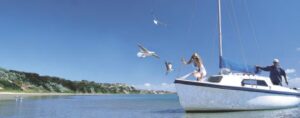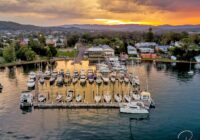By Roselle Tenefrancia – Editor Boat Gold Coast Magazine.
It initially seems paradoxical to be a boatie and be friendly to nature—unless you use a wind and solar-powered boat that is made of 100% biodegradable or recyclable materials. But even if you are not 100% natural, there are many ways to enjoy boating while lessening your impact on others and on our fragile environment.

1. REDUCE YOUR CARBON FOOTPRINT
Efficiency in engine power is key. While solar-powered engines are ideal, being a petrol engine user does not exempt you from caring for the environment. Even if you use petrol, you can still manage the way your engine works. Ensure that your engine is well maintained and cleaned as often as you use it. This not only provides efficient driving, but it also encourages longer engine life.
2. WATCH YOUR WAKE
Time and time again, we are reminded to watch our wake. It is particularly important to be mindful of how your wake affects other boats and other users of the water, as well as the environment. Don’t just watch your speed. Keep a good lookout (including astern), and slow down when you see vessels and persons who are vulnerable. Moreover, wakes from boats cause damage to fish, wildlife habitat, shorelines and shoreline structures over time.
3. USE NATURAL CLEANING PRODUCTS INSIDE AND OUTSIDE
By using phosphate-free biodegradable cleaning products you can minimise the impacts of greywater on the marine environment. Whenever possible, avoid discharging into the water, and conduct cleaning onshore.
4. DISPOSE OF WASTE PROPERLY
Use hazardous waste collection facilities for disposing paints, oil, oil filters, batteries, etc. Make sure you manage sewage wastes mindfully by only using shore-side facilities to pump out sewage. Any trash or rubbish (cigarette butts, plastic bags, fishing line, etc.) on board should remain on board until you are able to dispose of them on shore.
5. CONDUCT MAINTENANCE CHECKS AT ACCREDITED MARINAS AND BOATYARDS
If possible, perform work on the boat in accredited facilities where toxic wastes can be contained. If you have to do it yourself, ensure that you are able to contain the waste by using tarps or vacuum sanders to collect drips and debris for proper disposal.
6. KNOW OF WHICH MATERIALS YOUR BOAT AND ITS PARTS ARE MADE
Your boat may not find its end-of-life with you, but it does help to know what it is made of. When you do have to use a accessories or parts of your boat, you have to know how to dispose of them properly. Fibreglass, composite and plastic waste are not biodegradable, so their disposal should be conducted in professional facilities. Some boaties who are mindful of this are able to make decisions on which boat to buy based on how boats and boat parts are to be disposed of in the future.
7. SUPPORT AND PATRONISE MARINE BUSINESSES THAT ARE ECO-CONSCIOUS
There are several local marine businesses that are taking a more environmentally friendly path to running their enterprise. Whether it is reducing the use of electricity in their facilities (such as installing solar panels) or simply offering marine products that are accredited as natural and environmentally friendly, a marine business that promotes the protection of our environment through safe practices should be supported, as they will lead the way to your sustainable boating experiences.
8. BE AN AQUATIC STEWARD. EDUCATE YOURSELF AND OTHER BOATIES
The health of our waterways will determine the quality of our boating experiences. If we keep our waterways and the environment around them healthy, we are in for more pleasant experiences. As people whose lifestyle revolves around the water, we are not excused from learning and educating ourselves about the environment. After all, the water that we protect is the same water that supports our boating lifestyle.
Fuelling tip: When fuelling, stop the drops. Avoid fuel spills by filling tanks slowly and catching drips with absorbent pads.
Did you know that… A “wake” refers to the recirculating flow of water directly behind a moving vessel. A “wash,” which is a component of a wake, consists of broken or loose water, such as that tossed up by a propeller.
Cleaning tip: Use vinegar and baking soda as your general cleaning solutions. It’s cheap and non-toxic. To keep the inside smelling good, use natural oil or aromatherapy products.
Originally published in Boat Gold Coast. Reproduced with permission. For more stories and to view the Boat Gold Coast Magazine, visit their website here https://boatgoldcoast.com.au/ or to read the magazine visit: https://issuu.com/boatgoldcoast/docs/boat_gold_coast_magazine_oct_-_dec_2022
Roselle Tenefrancia

Roselle co-owns and is the Editor of one of Australia’s most popular Boating Magazines, Boat Gold Coast.
Roselle is both a journalist and lawyer, having practiced her trades across several well respected and well-known organisations. Roselle started Boat Gold Coast with husband Andy in 2014 having arrived in Australia from the Philippines two years earlier.
Roselle is passionate about the environment and human rights as is called on to speak at conferences or to provide advice.
Roselle has been Editor in Chief of a number of publications as well as applying her law background to work as a Legal Aid Program Adviser to the Office of the President of the Republic of the Philippines.
Most recently Roselle was part of a panel during the Australian Fairy Tale Society Conference, telling her own diaspora story through the remembering and retelling of Filipino folklore.
Roselle is now permanently located on the Gold Coast where she lives with her husband and son.







